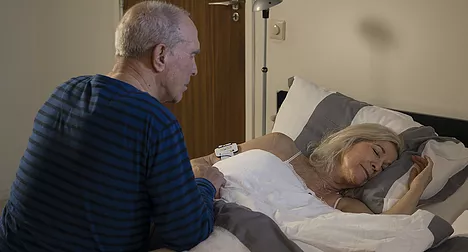Partner with Epilepsy
Partner with epilepsy
Having epilepsy can affect your partner in many ways but it also affects those around them.
Having a partner with epilepsy can impact on you considerably. You will help and support your partner as much as possible, both practically and mentally. That comes with responsibility. Such as your partner’s safety, for example. Epilepsy need not have a negative impact on your relationship with your partner. How, and how much epilepsy affects your relationship will depend on several factors, such as the type and frequency of seizures, responsiveness to medication, and the impact on everyday life and work. It is also important to consider your own uncertainties. Read how you can relieve stress and increase confidence if your partner has epilepsy.

The dependency of people with epilepsy
The level of your partner’s dependency significantly influences the impact their epilepsy has on you as their partner. This varies tremendously from person to person. With the right medication or therapy, many people can live a fairly independent life, for instance. This will have little impact on you, as a partner. It will also make things much easier mentally, as seizures will happen less frequently and be less severe. Other epileptics may always need help, while some people only need help during a seizure.
If the epilepsy is difficult to control with medication or therapy, the level of dependency will be higher but so too will the fear and anxiety. The uncertainty and stress about when a seizure may happen and how severe it will be will increase. If you find yourself in such a situation, it is especially important that you look after yourself as well. Seek and follow the advice of your doctor and neurologist.
Helping a partner with epilepsy
If your partner has an epileptic seizure it is important that you keep them safe. This means providing first aid, calling for medical assistance and, if necessary, administering emergency medication. An epileptic seizure will exhaust your partner and he/she will need to rest more. This could mean that you will need to take on more household and child care responsibilities.
You can also help your partner by being alert to any factors that could trigger a seizure, such as stressful situations, lack of sleep, alcohol and light stimuli, for example. If your partner has had one or more seizures before, try to identify the possible cause and be alert to that. That brings responsibility.
It is important to discuss this with your partner. Agreeing arrangements and good task sharing will create clarity and calm for you both. You will have a better understanding of what you can expect, which will probably result in less anxiety and stress. Most important of all is to be well informed about epilepsy and what it involves; read about it and read other people’s experiences.
Everyday life for people with epilepsy
Having a partner with epilepsy can also have a considerable impact on everyday life. Not just physically, such as a greater share of household responsibilities, but also mentally. Your partner may have always been very independent but suddenly have become much more dependent on you because of their epilepsy. The situation can be emotionally demanding for you. If your partner feels you are overly interfering or controlling, that could put pressure on your relationship. In addition, stress, depression and mood swings are side effects that many epileptics have. Try to find a new balance and avoid becoming or acting as a carer.
Depending on the severity of epilepsy, adjustments may also need to be made in the home. Safety at home is important for people with epilepsy. And is your partner allowed to drive or will you have to do all the driving? Do you still sleep well, or do you lie awake worrying that your partner might have a seizure? Your partner’s epilepsy affects your daily life in many more ways than you might think.
There may now also be risks involved in the activities you do together. Depending on the severity and frequency of your partner’s seizures, swimming or cycling together may be a challenge, for example. It is important to discuss this and to be well prepared. Make sure you know exactly what to do during a seizure. That will reduce the risks and enable you to do more together.

Epilepsy and sleep
While most people with epilepsy are still able to live an active life, some epileptic seizures can be dangerous. The person may injure themselves during a seizure, for instance, or not come out of a seizure and need medical intervention. Another risk is SUDEP.
A SUDEP is a Sudden Unexpected Death in Epilepsy. As the name suggests, the exact causes of SUDEP are not known. It happens most commonly in people who have severe nocturnal seizures, such as tonic-clonic seizures. However, SUDEP is also linked to tonic seizures, hypermotor seizures, and clusters of myoclonic seizures. SUDEP affects around 1 in 1,000 people with epilepsy each year. We know that the risk of SUDEP is smaller if someone else is in the same room during or immediately following the seizure.
NightWatch+ gives you more confidence and a better night’s sleep
A seizure detection system is a good way of helping you and your partner to feel safer and more confident.

Reliable seizure detection system
NightWatch is a seizure detection system that detects nine out of every ten clinically urgent seizures in an early stage. NightWatch offers added medical value by reducing the risk of medical complications. The system also gives you more confidence, less stress and a better night’s sleep. As well as your partner, the system can also give you more peace of mind. The wireless arm module monitors the patient’s heart rate and movements closely during the night. If a potentially serious epileptic seizure is detected, an alarm signal is sent to the corresponding base station.
Gives insight
NightWatch also gives more insight. You can read out the data via an online portal. You can also share the data; with your partner’s neurologist before their next appointment, for instance. This ensures that your partner is monitored using relevant data.